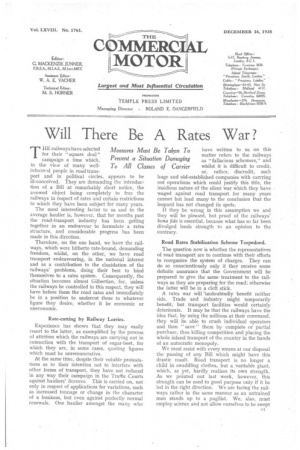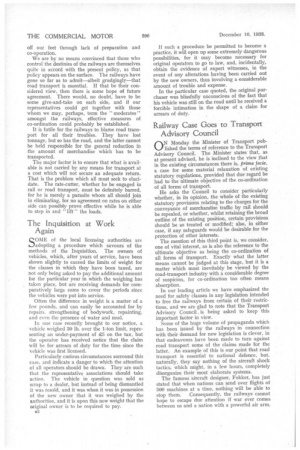Will There Be A Rates War?
Page 35

Page 36

If you've noticed an error in this article please click here to report it so we can fix it.
THE railways have selected for their "square deal" campaign a time which, in the view of many wellinform,;d people in road transport and in political circles, appears to be ill-conceived. They are demanding the introduction of a Bill at remarkably short notice, the avowed object being completely to free the railways in respect of rates and certain restrictions to which they have been subject for many years.
The most interesting factor to us and to the average haulier is, however, that for months past the road-transport industry has been getting together in an endeavour to formulate a rates structure, and considerable progress has been made in this direction.
Therefore, on the one hand, we have the railways, which were hitherto rate-bound, demanding freedom, whilst, on the other, we have road transport endeavouring, in the national interest and as a contribution to the elucidation of the railways' problems, doing their best to bind themselves to a rates system. Consequently, the situation becomes almost Gilbertian, for, unless the railways be controlled in this respect, they will have before them the road rates and immediately be in a position to undercut these to whatever figure they desire, whether it be economic or uneconomic.
Rate-cutting by Railway Lorries.
Experience has shown that they may easily resort to the latter, as exemplified by the process of attrition which the railways are carrying out in connection with the transport of sugar-beet, for which they are, in some cases, quoting figures which must be unremunerative.
At the same time, despite their voluble protestations as to their intention not to interfere with other forms of transport, they have not reduced in any way their campaign in the Traffic Courts against hauliers' licences. This is carried on, not only in respect of applications for variations, such as increased tonnage or change in the character of a business, •but even against perfectly normal renewals. One haulier amongst the many who have written to us on this matter refers to the railways as "fallacious schemers," and whilst it is difficult to credit, or, rather, discredit, such huge and old-established companies with carrying out operations which could justify this title, the insidious nature of the silent war which they have waged against road transport for many years cannot but lead many to the conclusion that the leopard has not changed its spots.
If they be wrong in this assumption we and they will be pleased, but proof of the railways' bona fide is essential, because what has so far been divulged lends strength to an opinion to the contrary.
Road Rates Stabilization Scheme Torpedoed.
The question now is whether the representatives of road transport are to continue with their efforts to reorganize the system of charges. They can do so conscientiously only it they receive some definite assurance that the Government will be prepared to give the same treatment to the railways as they are preparing for the road; otherwise the latter will be in a cleft stick.
A rates war will undoubtedlybenefit neither side. Trade and industry might temporarily benefit, but transport facilities would certainly deteriorate. It may be that the railways have the idea that, by using the millions at their command, they will be able to crush individual operators and then " save " them by complete or partial purchase, thus killing competition and placing the whole inland transport of the country in the hands of an autocratic monopoly.
We muSt resist with every means at our disposal the passing of any Bill which might have this drastic result. Road transport is no longer a child in swaddling clothes, but a, veritable giant, which, .as yet, hardly realizes its own strength. As we pointed out last week, however, this strength can be used to good purpose only if it be led in the right direction. We are facing the railways rather in the same manner as an untrained man stands up to a pugilist. We, also, must employ science and not allow ourselves to be swept off our feet through lack of preparation and co-operation.
We are by no means convinced that those who control the destinies of the railways are themselves quite in accord with the present policy, as that policy appears on the surface. The railways have gone so far as to admit—albeit grudgingly—that road transport is essential. If that be their considered view, then there is some hope of future agreement. There would, no doubt, have to be some give-and-take on each side, and if our representatives could get together with those whom we may, perhaps, term the "moderates " amongst the railways, effective measures of co-ordination could probably be established. It is futile for the railways to blame road transport for all their troubles. They have lost tonnage, but so has the road, and the latter cannot be held responsible for the general reduction in the amount of merchandise which has to be transported.
The major factor is to ensure that what is available is not carried by any means for transport at a cost which will not secure an adequate return. That is the problem which all must seek to elucidate. The rate-cutter, whether he be engaged in rail or road transport, must be definitely barred, for he is merely a parasite whom all should join in eliminating, for no agreement on rates on either side can possibly prove effective while he is able to step in and " lift " the loads.
The Inquisition at Work Again
SOME of the local licensing authorities are adopting a procedure which savours of the methods of the Inquisition. The owners of vehicles, which, after years of service, have been shown slightly to exceed the limits of weight for the classes in which they have been taxed, are not only being asked to pay the additional amount for the particular year in which the weighing has taken place, but are receiving demands for comparatively large sums to cover the periods since the vehicles were put into service.
Often the difference in weight is a matter of a few pounds, and can easily be accounted for by repairs, strengthening of bodywork, repainting, and even the presence of water and mud.
In one case recently brought to our notice, a vehicle weighed 30 lb. over the 1-ton limit, representing an under-payment of 0 on the tax, but the operator has received notice that the claim will be for arrears of duty for the time since the vehicle was first licensed.
Particularly curious circumstances surround this case, and indicate a danger to which the attention of all operators should be drawn. They are such that the representative associations should take action. The vehicle in question was sold as scrap to a dealer, but instead of being dismantled it was resold, and it was when it was in possession of the new owner that it was weighed by the authorities, and it is upon this new weight that the original owner is to be required to pay. If such a procedure be permitted to become a practice, it will open up some extremely dangerous possibilities, for it may become necessary for original operators to go to law, and, incidentally, obtain the evidence of expert witnesses, in the event of any alterations having been carried out by the new owners, thus involving a considerable amount of trouble and expense.
In the particular case quoted, the original purchaser was blissfully unconscious of the fact that his vehicle was still on the road until he received a forcible intimation in the shape of a claim for arrears of duty.
Railway Case Goes to Transport Advisory Council
ar-NN Monday the Minister of Transport pub lished the terms of reference to the Transport Advisory Council. The Minister states that, as at present advised, he is inclined to the view that in the existing circumstances there is, prima facie, a case for some material relaxation of existing statutory regulations, provided that due regard be had to the ultimate objective of the co-ordination of all forms of transport. He asks the Council to consider particularly whether, in its opinion, the whole of the existing statutory provisions relating to the charges for the conveyance of merchandise traffic by rail should be repealed, or whether, whilst retaining the broad outline of the existing position, certain provisions should be so treated or modified; also, in either case, if any safeguards would be desirable for the protection of other interests. The mention of this third point is, we consider, one of vital interest, as is also the reference to the ultimate objective as being the co-ordination of all forms of transport. Exactly what the latter means cannot be judged at this stage, but it is a matter which must inevitably be viewed by the road-transport industry with a considerable degree of suspicion, for co-ordination too often means absorption. In our leading article we have emphasized the need for safety clauses in any legislation intended to free the railways from certain of their restrictions, and we are glad to note that the Transport Advisory Council _ is being asked to keep this important factor in view. Some of the huge volume of propaganda which has been issued by the railways in connection with their demand for new legislation is clever, in that endeavours have been made to turn against road transport some of the claims made for the latter. An example of this is our point that road transport is essential to national defence, but, naturally, they say nothing of the aircraft shock tactics, which might, in a few hours, completely disorganize their most elaborate systems. The famous aircraft designer, Fokker, has just stated that when nations can send over flights of 500 machines at a time, nothing will be able to stop them. Consequently, the railways cannot hope to escape due attention if war ever comes between us and a nation with a powerful air arm.




























































































